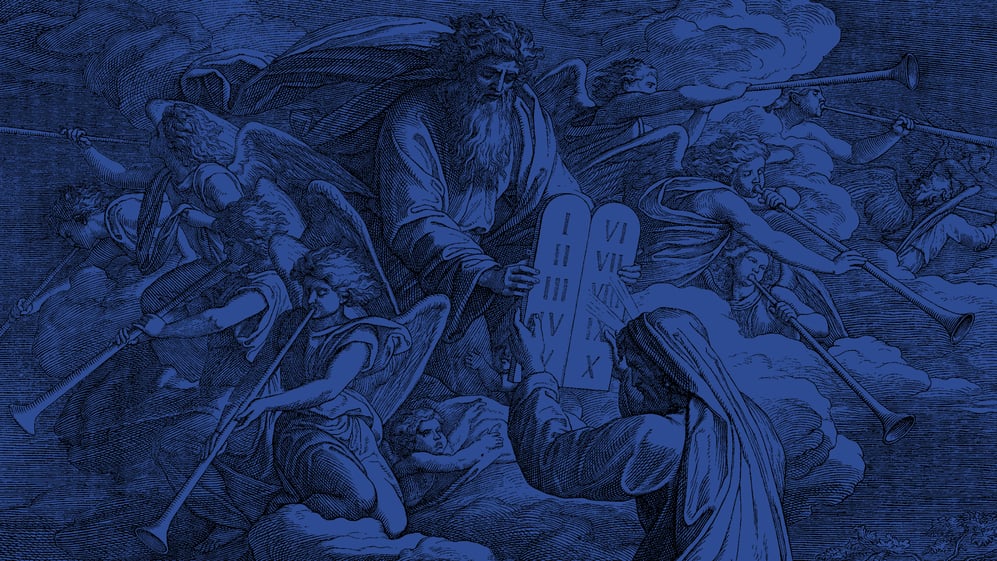The Lord Almighty is a gracious, loving Father. This is exemplified throughout the Bible, both in His compassion for the Israelites and in His Son, Jesus Christ. Just as God daily shows grace to each and every one of His children, we too must also strive to share this grace with others.
Scripture Interprets Scripture
There is a strong theme of grace that binds the three weekly readings together. In Exodus 19:2-8, we learn that God has led the people of Israel, under the leadership of Moses, from Rephidim to the wilderness of Sinai. Soon the Lord will provide the Ten Commandments. It is here that the Lord makes His covenant of obedience with the people.
There are two important points. Firstly, the Israelites have reached this point purely by God’s grace. He released them from slavery and provided water, manna, and quail.
The Gospel reading further illustrates this grace. In Matthew chapter nine, Jesus teaches in “cities and villages.” In doing so, He sees the affliction of the people and has compassion, healing the sick and driving out demons. God has compassion and acted first, both in Egypt and the cities and villages. The tie comes in verse eight of the Romans reading that “God shows his loves for us in that while we were sinners, Christ died for us.” The reoccurring theme is the grace of God from a loving and compassionate heart, ministering to both physical and spiritual needs on His initiative.
The second point is God’s giving of the Law and humanity’s responsibility. The people gathered at Mount Sinai are poised to the receive the Law. Nevertheless, they have always been responsible for it. God’s covenant is that they would listen to His voice and He would make them a treasured possession. Connected to this, Paul explains that all men have sinned. Although the Law is not given until Sinai, humanity cannot claim ignorance. Adam and Eve knew God’s expectation, and so do we.
Digging Out the Gems
In verse seven, we encounter two words which are quite similar, “δικαίου” and ” ἀγαθοῦ,” translated “righteous” and “good,” respectively. It is important to note “righteous” connotes one who works diligently to follow God’s Law. We might think of the Pharisees, who, however well they kept the Law themselves, pressed the average person harshly to do so. “Good” connotes purity and acceptability in its nature. We think of the lamb chosen as a sacrifice being “good.” Jesus says that no one is good except for God alone, and so forth.
Verse nine illustrates the difference. “δικαιωθέντες” is translated “having been justified.” It is worthwhile to notice that the verb is passive; God did this to us. This ties in with the grace theme that runs through all three passages. Moreover, the verb is the same as “δικαίου.” So, in Christ, we are made like one who has kept the Law perfectly. Regarding the Law, we are made like Jesus.
Law and Gospel
Dovetailing on the point above regarding the giving of the Law, we recognize that sinful nature is perpetually looking to evade culpability before God. In Romans chapter five, Paul states that “sin came into the world through one man.” The scoffer claims, “No fair! I didn’t choose to be born and inherit my parents’ sinful nature. It’s not my fault that Adam and Eve sinned!” Aside from the issue of passive heredity, fair or not, all men have sinned in their own right. Further, the sinful nature is in one respect an illness of heredity, like a predisposition to cancer or schizophrenia. I don’t choose to inherit schizophrenia, but it is mine, nonetheless. I need a solution.
The Gospel presents this same issue of heredity through Christ. All humans have inherited the sinful nature through Adam’s flesh. Jesus is the Second Adam who comes in the same flesh, but without sin. Where the first Adam failed to keep the Law, Jesus kept is perfectly. He then shed His blood in that flesh to make us “righteous” and “good” through faith. In Holy Baptism, we are connected to Christ’s flesh. In flesh, Jesus died and rose from the grave. In Him, we died to sin and rise from the waters of Holy Baptism. We inherit sin through Adam’s flesh. We inherit forgiveness and life through Christ’s. This issue of flesh also ties in naturally to Holy Communion.
Preaching and Teaching
Bankruptcy offers an excellent analogy for teaching. In these present times of pandemic and uncertainty, many individuals and business will declare bankruptcy. As great a challenge as bankruptcy is for the person or business, it also has consequential impact on others. Creditors received mere pennies on the dollar from persons who declare bankruptcy. These creditors pass this on to others in the form of higher prices and loss of jobs due to decreased revenue. Others pay for the shortfalls of those in debt. Jesus pays the shortfall for sinners.
For more doctrinal context on the book of Romans, purchase the Concordia Commentary on verses 9–16.












